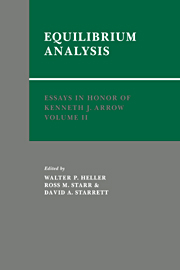Book contents
- Frontmatter
- Contents of Volumes I, II, III
- List of contributors
- Editors' preface
- Kenneth J. Arrow
- Contents
- PART I GENERAL EQUILIBRIUM
- PART II MICROFOUNDATIONS OF MACROECONOMICS
- 7 Price flexibility, inventory behavior, and production responses
- 8 On asymmetric information, unemployment, and inflexible wages
- 9 Asymmetric adjustment costs and sectoral shifts
- 10 Implicit contracts and risk aversion
- 11 An exercise in non-Walrasian analysis
- 12 Monopolistic competition and the multiplier
- Author index
11 - An exercise in non-Walrasian analysis
Published online by Cambridge University Press: 25 October 2011
- Frontmatter
- Contents of Volumes I, II, III
- List of contributors
- Editors' preface
- Kenneth J. Arrow
- Contents
- PART I GENERAL EQUILIBRIUM
- PART II MICROFOUNDATIONS OF MACROECONOMICS
- 7 Price flexibility, inventory behavior, and production responses
- 8 On asymmetric information, unemployment, and inflexible wages
- 9 Asymmetric adjustment costs and sectoral shifts
- 10 Implicit contracts and risk aversion
- 11 An exercise in non-Walrasian analysis
- 12 Monopolistic competition and the multiplier
- Author index
Summary
Kenneth Arrow “bestrides the world like a colossus,” and in this instance that is a cause for celebration and not for conspiracy. There is hardly any area of our subject which he has not illuminated and often profoundly changed. But I hold it to be an almost equal claim on our admiration that he has always known what he is about. This is a surprisingly rare virtue among economists. By “knowing what he is about” I mean that he has always been as much aware of what has been left out as of what his virtuosity allowed him to include. That is why having (with Debreu) founded modern general equilibrium theory, we find him also active in information theory, organisation theory, and the theories of racial discrimination and of health insurance, to name only a few. There is no evidence that he has ever considered it satisfactory to assume actual economies to be (more or less) perpetually in Arrow–Debreu equilibrium. Indeed, his pioneering work with Hurwicz on stability suggests that he has very properly held the view that the triumph of the invisible hand in bringing about equilibrium, if indeed it does this, is something to be explained and not assumed. In other words, like all great theorists, he has always known precisely what the limits of applicability of any given theory are.
The present essay is written in what I hope is the Arrowian spirit although, alas, without Arrowian penetration and conclusiveness.
- Type
- Chapter
- Information
- Essays in Honor of Kenneth J. Arrow , pp. 289 - 300Publisher: Cambridge University PressPrint publication year: 1986



